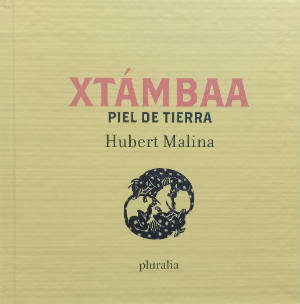Xtámbaa / Piel de Tierra. Hubert Matiúwàa. Mexico City: Pluralia Ediciones. 2016.
 The stalk of our rage grows, Hubert Malina (Matiúwàa) tells us in one of the poems from Xtámbaa / Piel de Tierra. He speaks to us of the mountains of Guerrero, Lucio’s house, so vital to him, the buses that never return. If we have kept up with the news lately we know what he’s talking about and at the end of our reading we should have not one stalk but entire fields sown in a rage that might flower so as to change things for the better in this country. It can’t be any other way.
The stalk of our rage grows, Hubert Malina (Matiúwàa) tells us in one of the poems from Xtámbaa / Piel de Tierra. He speaks to us of the mountains of Guerrero, Lucio’s house, so vital to him, the buses that never return. If we have kept up with the news lately we know what he’s talking about and at the end of our reading we should have not one stalk but entire fields sown in a rage that might flower so as to change things for the better in this country. It can’t be any other way.
In this collection, exquisitely illustrated by Alec Dempster, and accompanied by Manual Ndiva’í’s photographs, it feels as if someone were tearing away our heart and skin. I could tell you that you will enjoy the drawings, the level of artistry, the carefully constructed imagery, the use of language and figures of speech, though I must confess that I only managed to read the book in fragments since again and again my eyes filled with tears when faced with the pain of Hubert’s stories, so close to my own. It was hard to swallow all at once, I had to go slow, take small bites.
If only we poets could write purely for beauty’s sake, then Hubert wouldn’t have to speak about absence, pain, lost traditions, kidnappings, human trafficking, desperate migrations, the military state, assassinations. Whoever reads these poems without feeling rage, pain, indignation and a boiling in the blood beneath their skin should stop pretending to care about indigenous peoples, should put aside their political correctness, since that’s the last thing you’ll find between the pages of Xtåmbaa.
Poetry has its traps. Along with pretty words, Hubert tells about the Mèpháá people. Legends and stories gleaned from his grandmother’s lips, but also harsher realities, full of uncertainty and tinged with red. His words, passed on by his parents and grandparents, guide our eyes, ears and hearts through the sweetest and most terrible verses. Through seven sections (my voice’s scar; the dogs cried out; grandmother’s voice; grandmother’s silence; opossum; man of skin and earth’s skin) and with the bravery that such a path requires, Hubert Malina talks about things that we often prefer to ignore: the exploitation of natural resources, human life and liberty destroyed; boys and girls sold into sexual slavery; violence and insecurity orchestrated by the State and organized crime to justify deploying the armed forces, whose job we know is not really to protect but rather to allow mining companies to plunder while displacing entire peoples, leaving their lands in criminal hands.
In Xtámbaa the Mè pháá poet reminds us of the sound of hunger, a hunger that doesn’t exist on its own but has been manufactured. For example, as the collection mentions, by stripping natural resources from those same brothers. I won’t say owners because owners exploit, unlike those who have been age-old brothers of the Earth and Nature, who unite with the natural world in order to keep sowing life. Now they have not only separated the indigenous from the land, they have also separated us from observing nature, the oral tradition, the ancient wisdom. They are pushing us to exterminate our self-sufficiency and lose our autonomy, by creating conditions that reduce us to physical, cultural and ideological poverty. In several poems, Hubert points out how we seek to blot out the sound of hunger, no longer with the joy of pulque or mezcal, but with a sadness bottled under the label, “corona extra.”
In Guerrero there are stories that poetry cannot contain. They cannot be told in tropes. So the poet calls them by their name and tells us of the little flayed buck who was going to be a teacher and of the brothers who disappeared. He introduces us to Iguala and to all the bloody nights that have stained the earth’s skin, leaving deep scars and wounds opened in 43 lives we still want back.
You will enjoy the book if you are able to transform indignation into something more than memes and likes; if you’re able to be moved enough to make a difference from your own little corner, to do something that might improve things in this wounded, ransacked country. Poetry will be grateful to you.
Irma Pineda
Translated by Clare Sullivan





